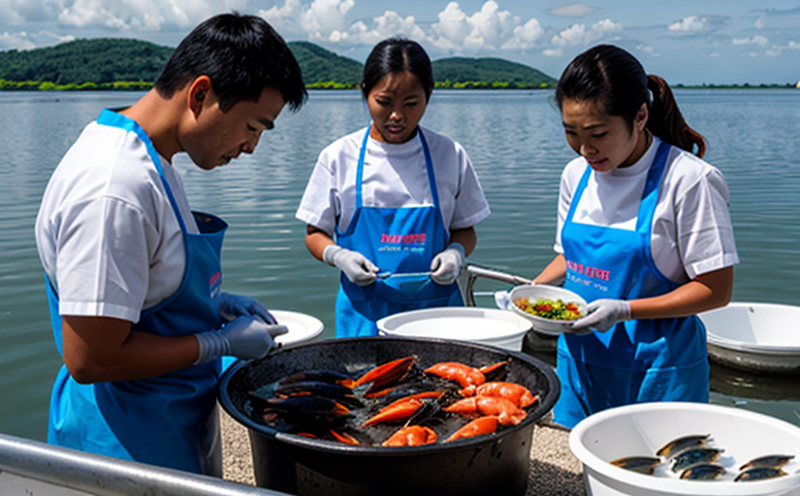ISO 28422 Heavy Metal Multi-Residue Screening in Seafood
The ISO 28422 standard provides a robust framework for the multi-residue screening of heavy metals, particularly relevant to the seafood and aquaculture sector. This testing is crucial for ensuring food safety and compliance with international regulatory standards.
Heavy metal contamination in seafood can lead to serious health risks, including neurological damage, kidney disease, and cancer. The ISO 28422 standard ensures that seafood products are free from excessive levels of harmful metals such as arsenic (As), cadmium (Cd), chromium (Cr), copper (Cu), mercury (Hg), nickel (Ni), lead (Pb), selenium (Se), and others.
The testing process involves several critical steps. Specimen preparation is essential to ensure accurate results. Samples are typically collected from various stages of production, including raw materials, intermediate products, and final products. The samples undergo digestion using strong acids in a microwave-assisted system to release heavy metals into solution for analysis.
The analytical instrumentation used for this testing includes inductively coupled plasma-mass spectrometry (ICP-MS) or atomic absorption spectroscopy (AAS). These techniques offer high sensitivity and precision, making them ideal for detecting trace levels of heavy metals. The standard specifies the use of certified reference materials to calibrate instruments and validate results.
The acceptance criteria are stringent, adhering to international standards such as ISO 28422:2019. Samples are considered compliant if all detected metal concentrations fall below the specified maximum limits. Compliance with these limits is crucial for maintaining product quality and ensuring consumer safety.
ISO 28422 testing is particularly important in the seafood industry, where contaminants can enter through various pathways such as water pollution, agricultural runoff, or industrial emissions. Regular screening helps identify potential risks early, allowing producers to take corrective actions before they impact product quality and market reputation.
In addition to ensuring safety, this test supports sustainability initiatives by identifying environmental sources of contamination. By addressing these issues proactively, the industry can reduce its ecological footprint and promote responsible practices.
- Comprehensive Coverage: ISO 28422 covers a wide range of heavy metals, ensuring thorough screening.
- International Compliance: The standard aligns with global regulatory requirements, facilitating international trade.
- High Precision: Advanced analytical techniques provide accurate and reliable results.
- Environmental Awareness: Helps identify and mitigate environmental contamination sources.
Dedicated to Quality: Eurolab's Advantages
Eurolab, as a leading laboratory in food and feed testing, offers unparalleled expertise in ISO 28422 heavy metal multi-residue screening. Our state-of-the-art facilities and experienced scientists ensure the highest standards of accuracy and reliability.
We employ cutting-edge technology, including advanced analytical instruments like ICP-MS and AAS, to conduct precise tests. Our certified laboratories adhere strictly to ISO 28422:2019 guidelines, ensuring consistent results across all samples.
Our team of quality managers, compliance officers, and R&D engineers is dedicated to providing comprehensive services tailored to your specific needs. We offer rapid turnaround times, flexible scheduling options, and detailed reports that meet regulatory requirements.
In addition to technical excellence, Eurolab prioritizes customer satisfaction by offering transparent communication throughout the testing process. Our commitment to quality is reflected in our certifications from reputable bodies such as ISO/IEC 17025:2017 for laboratory competence and proficiency.
Why Choose This Test
- Comprehensive Analysis: Screen multiple heavy metals in a single test, saving time and resources.
- Regulatory Compliance: Ensure adherence to international standards like ISO 28422:2019.
- Risk Management: Identify potential contamination sources early for proactive intervention.
- Consumer Confidence: Maintain product quality and enhance market reputation by demonstrating commitment to safety.
Competitive Advantage and Market Impact
In today's competitive food industry, maintaining product quality and ensuring compliance with international standards is essential. By implementing ISO 28422 heavy metal multi-residue screening, businesses can gain a significant competitive edge.
Clients who choose Eurolab for this service benefit from enhanced brand reputation due to transparent quality management practices. This transparency fosters trust among consumers and stakeholders, leading to increased market share and customer loyalty.
Moreover, the ability to detect and address contamination issues promptly can prevent costly recalls and legal disputes. By staying ahead of regulatory changes and industry trends, businesses can ensure sustained growth and profitability.





